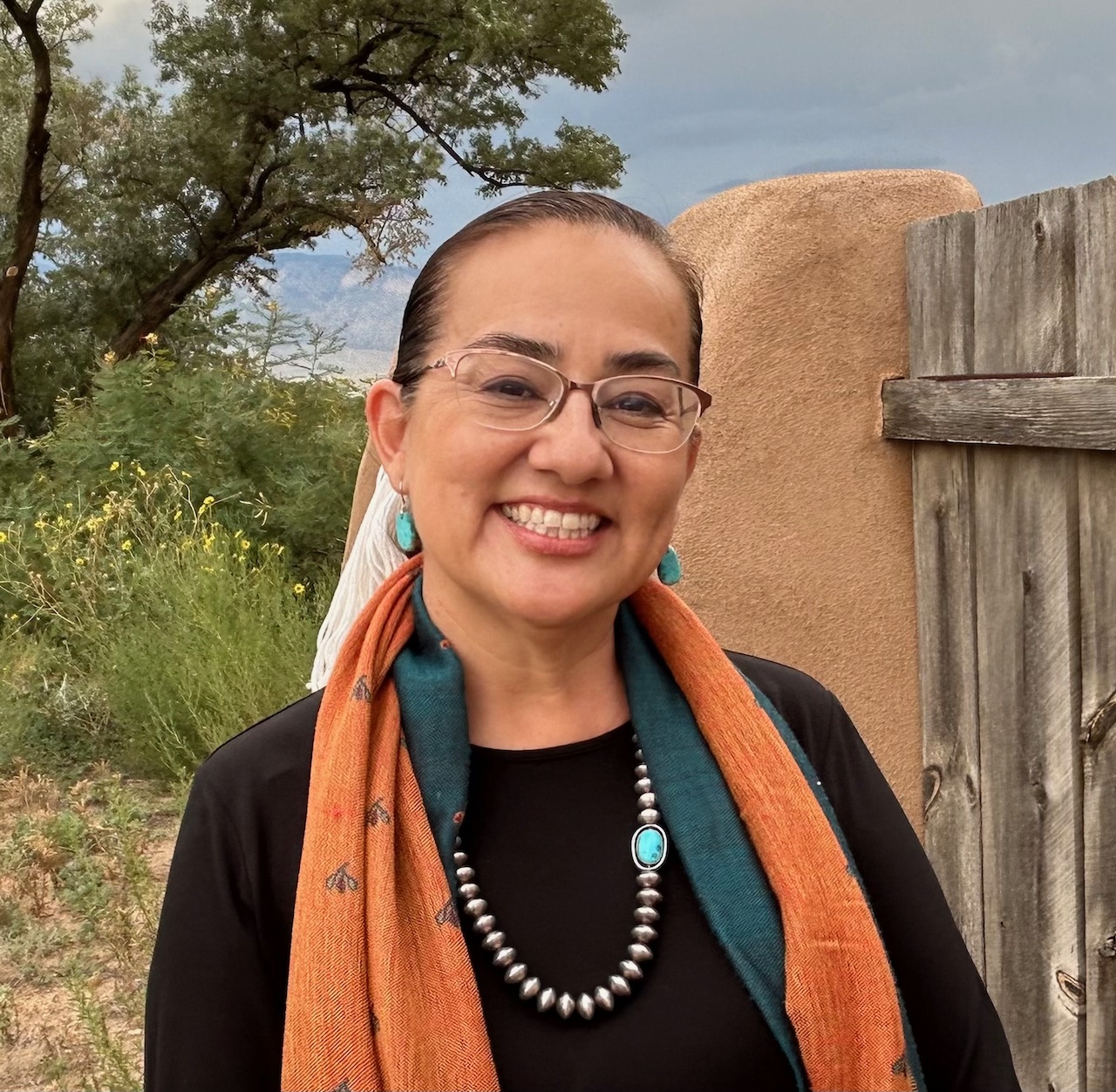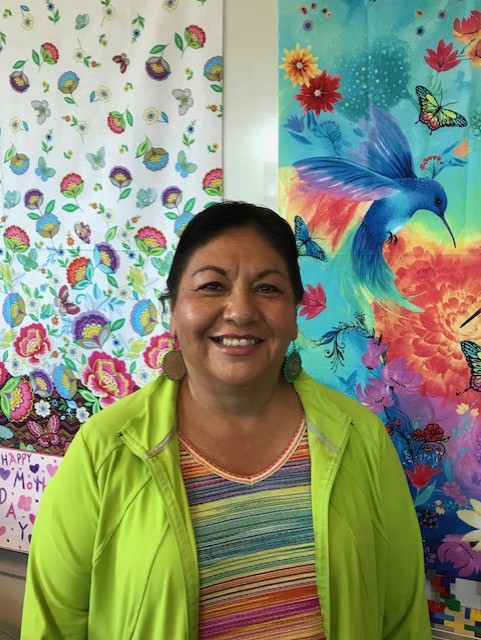About Us
The University of New Mexico Native American Budget and Policy Insitute was originally developed as an ougrowth of the issues and ideas derived by the Leadership Institute at the Santa Fe Indian School and funded by a grant through an agreement with the Regents of the University of New Mexico (UNM) and the New Mexico Center on Law and Poverty (NMCLP) as a sub-recipient to improve the health, educational and economic well-being of vulnerable Native American children and families by enhancing capacity to conduct budget and policy analysis specific to Native American Communities.
UNM NABPI Governance Council
Unique to the design of the Institute is an external Governance Council that exisits outside of the University. The role of the Governance Council is to provide oversight, direction, and support of the mission and goals of the Institute. Our current members are:
|
Jeff Atencio (Ohkay Owingeh, Pueblo of Laguna) has over 20 years of experience in tribal program development, renewable energy advocacy, and economic development. As the owner of Rainstorm Consulting, he advises Pueblos, Tribes, and Nations on strategic initiatives, including renewable energy projects and business development. His leadership as Tribal Administrator for Picuris Pueblo was instrumental in bringing a 1MW solar array online, advancing energy sovereignty for Tribal Nations. He has also consulted with Indigenous businesses under a contract with Vida Mejor Capital. Jeff, a U.S. Navy veteran and artist, currently serves as Vice Chairman of the Board of Directors for Native Community Capital and as an advisory board member for the Rio Grande Community Development Corporation. He is a co-author of a NASA Astrobiology Community Engagement Plan and served as an advisor on the Rocky Mountain Emmy Award-winning documentary However Wide the Sky: Places of Power.
|
|
Manisha Desai is the Executive Director of Center for Changing Systems of Power and the Empowerment Trust Endowed Professor of Global Citizenship at Stony Brook University. Her areas of research and teaching include gender and globalization/development, transnational feminisms, global justice, particularly climate justice movements and human rights. Her current research includes women's rights, land rights, and climate justice in India and NE United States. As a senior research associate of the United Nations Research Institute for Social Development, Manisha is part of the Global Network for Research and Action for a new eco-social contract. She is on the Steering Committee of the Federation of Feminist Journal Editors that is seeking to establish a feminist, knowledge commons outside commercial publishing to ensure the free circulation of feminist knowledge across borders and language barriers. In 2015, Manisha was awarded the Sociologist for Women in Society Distinguished Feminist Award and received the 2016 Faculty Mentor Award from the Compact for Faculty Diversity in the U.S. She has served in many leadership capacities including as President of Sociologist for Women in Society. |
|
James Fenelon is Professor and Director of Center for Indigenous Peoples Studies, California State University, San Bernardino, and currently Lang Visiting Professor for Social Change at Swarthmore College. He published Redskins?: Sports Mascots, Indian Nations, and White Racism (2017) to combat racial icons in sports and society, following his earlier books Culturicide, Resistance and Survival of the Lakota (Sioux Nation) using critical analysis to support tribal sovereignty of Native Nations, and Indigenous Peoples and Globalization (with Thomas Hall) showing resistance and revitalization strategies using world-systems analysis. He just completed Indian, Black and Irish: Capitalism, Colonization and Racism in America (Routledge) demonstrating 500 years of racial struggles leading to United States neoliberal hegemony. Professor Fenelon now works on Climate Change environmental and War, Peace and Conflict engaged scholarship, publishing on those topics and related social sciences (ethnic and urban studies, Indian education, migration, genocide…) in numerous journal articles and book chapters (40+). James is Dakota/Lakota, Gaelish Irish, French and Scandinavian descent, advocates for social justice, Indigenous critiques and believes in respect for all life on earth.
|
|
Michael Lipsky is a retired professor of political science (University of Wisconsin, Massachusetts Institute of Technology). Subsequently, he served as a Senior Program Officer at the Ford Foundation, making grants on government performance and accountability. At Ford he worked with faculty at Harvard University to establish “Honoring Nations,” a program of the Harvard Project on Indigenous Governance and Development celebrating the achievements of American Indian Nations in promoting excellence in governance through innovative programs. He describes its origins in “A Small Grant Can Go A Long Way: Building Support for Native American Governance,” HISTPHIL, posted June 9, 2020. He serves on the Honoring Nations Board of Governors. His publications include Protest in City Politics; Nonprofits for Hire: The Welfare State in the Age of Contracting (with S.R. Smith); and the award-winning Street-Level Bureaucracy. He is a graduate of Oberlin College, and received an M.P.A. and Ph.D. in politics from Princeton University. He is an elected Fellow of the National Academy of Public Administration. |
|
Dr. Chenoa Bah Stilwell-Jensen, Chenoa Bah is Dine from Tseyaat’ó, New Mexico, on the Navajo Nation. She has worked in public health extensively in community based, tribal, and clinical settings. She attained her PhD in Health and Cultural Communication at the University of New Mexico. She has taught for over 15 years at UNM, Institute of American Indian Arts and CNM. She presently teaches in the Pre-Health Scholars Certificate program. Her experiences range from pediatric and school-based health center provider training to a non-profit clinic with cultural wellness at First Nations Community HealthSource, and community health engagement. She worked to promote healthy lifeways using holistic teachings connected to plants, water, and the land. She co-founded a local charter school in Albuquerque called NACA (Native American Community Academy) and worked together with families to create a Wellness Model and curriculum for student and family well-being. As a cultural advocate and a mother, Chenoa Bah, advocates for the importance of social justice through culturally-centered health communication, Indigenized health promotion, land-based learning, supportive resources for unsheltered relatives, food sovereignty and actively cultivates traditional lifeways with youth and communities. |
| Ingeborg Vicenti (Jicarilla Apache) is a Mental Health Therapist at Dulce Public Schools. Specializing in Native American youth therapy and Native American community development, she has been a consultant for Native American Youth Projects, coordinated Native American healing projects, worked on the Jicarilla Apache National Historical Trauma project, and presented on historical trauma at the World Indigenous Peoples Conference on Education in both Seattle and Melbourne, Australia. Ingeborg holds a Masters in Psychology from Santa Fe University of Art and Design.
|
Tara Gatewood (Isleta/Dine) - An award winning and enrolled citizen of the Pueblo of Isleta/Diné, is currently the Director of the International Women’s Media Foundation’s Fund for Indigenous Journalists Reporting on Missing and Murdered Indigenous Women, Girls, Two-Spirit and Transgender People (MMIWG2T) which is an initiative that directly supports Indigenous journalists’ reporting on the issue of MMIWG2T and the violence that targets members of Indigenous nations. She is the former host and producer of Native America Calling. She currently the voice of Indigenous Foundation – a music and public affairs program heard on Santa Fe New Mexico’s KSFR 101.1 FM each Saturday 3-5 p.m. Mountain Time. Tara teaches “Indigenous People on Screen” at the University of New Mexico in the department of Film and Digital Arts. Tara is also a community curator/co-curator as a part of the Pueblo Pottery Collective with the Grounded in Clay: The Spirit of Pueblo Pottery.
Peter Lengkeek (Crow Creek Sioux Tribe) - Bio forthcoming
Patricia Salazar Ives is a partner in the firm of Cuddy & McCarthy, LLP. Her primary practice areas are employment, public utilities, telecommunications, education, public school bonds and finance, Indian Law, insurance defense and civil rights law and litigation. Patricia’s state professional associations include the State Bar of New Mexico, the New Mexico Hispanic Bar Association and the New Mexico Defense Lawyers Association. She served as a member of the State Bar of New Mexico Task Force on Minority Involvement in the Profession. Patricia’s national professional associations include the American Bar Association, the National Hispanic Bar Association, the Council of School Attorneys of the National School Boards Association, and the National Organization on Legal Problems in Education. She is a member of the Navajo Nation Bar Association, and has served as a member of the Navajo Nation Bar Association Training Committee since 2006. Born and raised in Northern New Mexico, Patricia is fluent in Spanish, and provides pro bono services to non-profit organizations.





